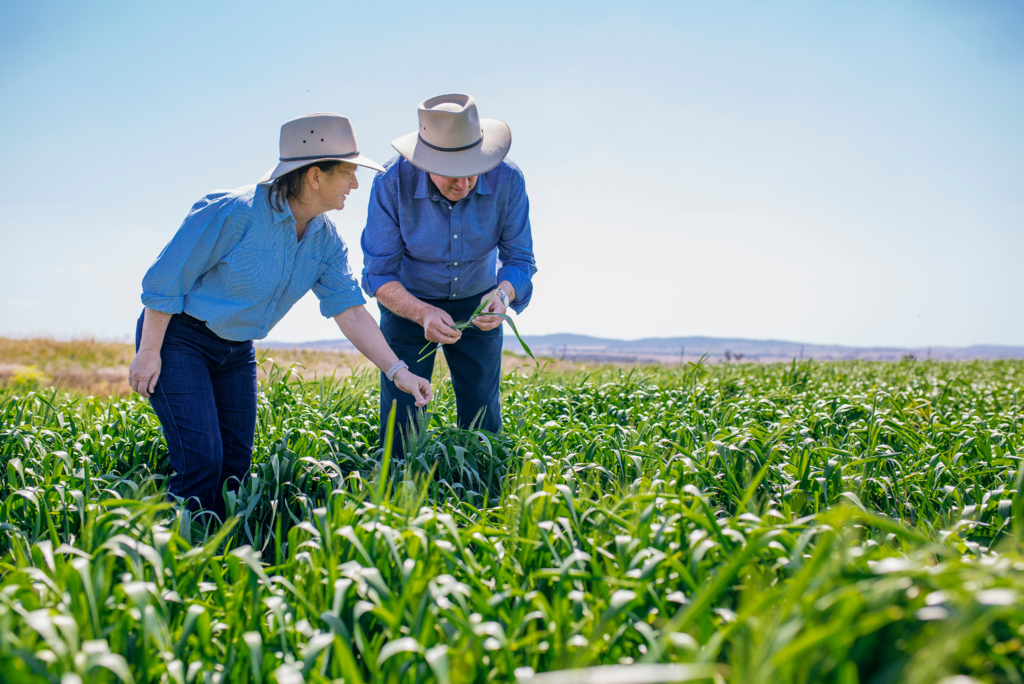Producers who inspire: Bede + Narelle Burke
When it comes to agricultural innovation and sustainability, third-generation north-western NSW farmer Bede Burke and wife Narelle know well the value of not putting all your eggs in one basket. Twenty-five years ago, when the couple (pictured left) took on the Glenwarrie Partnership started by Bede’s parents and grandparents near Tamworth in 1957, they had a vision to expand the poultry mainstay of the livestock and cropping business.
“Always invest heavily in appropriate tools of trade,” Bede told The Cultivator about some of the best farming advice he’d received on the road to best-practice closed-loop egg production.
“And have as much control as possible over every aspect of our operation,” added Narelle about their ongoing investment in technology for vertically integrated and sustainable systems that redirect waste to improve pastures for growing grain, then mill that grain for feed.
Today, their 1400ha mixed farming operation – focusing on laying hens and pullet rearing as well as prime lamb and beef cattle – has installed a state-of-the-art cage production system with packing machines and highly efficient automated feed and watering systems. It also produces most of its own feed requirements though a refitted, integrated mill; and has extensive on-farm compost to fertilise winter and summer crops.
Bede said they also sell the grain they don’t need for feed – including about 300 tonnes a year of durum wheat to Manildra’s Gunnedah mill.
“We also buy from Manildra 25 tonnes of canola meal a month and 60 tonnes of canola oil a year, so it’s a strong relationship that works very well with purchase and supply,” he said.
Bede said the biggest contributors to better gross margins in the past decade had been switching to a no-till cropping system, adoption of auto-steer technologies, and converting manure biomass into compost for better grain yield, weight and protein.
He said their technology investments had “absolutely” paid off already. “It’s the chicken or egg story – can you afford to not uptake technology? There is financial pain during the payback period but the benefits last much longer.”
Bede is also a believer in driverless tractors – “however they’ll still require a cab, training, set-up, and repeat drive options”.
Glewarrie’s investment in more efficient and renewable power includes a proposed expansion of their two five-kilowatt solar systems to 100kW, estimated to save about 30 per cent on their energy costs (and with a three-and-a-half-year payback period), while decreased tillage has been a major contributor to their reduction in diesel costs.
The mixed farming business’ innovative and sustainable approach without compromising profitability has earned the couple numerous industry accolades, including the 2011 Tamworth Business Chamber’s Best Regional Business Award, being named a finalist as the 2009 NSW Farmer of Year, and the 2009 Brownhill Cup for Sustainable Farming.
Bede has also been active in industry and community projects, currently serving his fourth term as NSW National Party Chairman, as well as Chairman of the NSW Farmers Egg Committee and rural merchandising company Tamworth Rural, and Deputy Captain of the Tamworth branch of the NSW Rural Fire Service.
Manildra Grain Buyer Peter Sloan said Bede’s positive outlook and long history of supporting
the Australian agricultural industry was as reliable as Glenwarrie’s “quality product that fits our customers’ requirements” – with the coarser durum wheat perfect for making pasta.
For a young person entering into a farming enterprise, Bede offers some advice in improving efficiency. “Engage with your neighbours – talk, look, see, ask, and always seek self-improvement,” he said. “Visit field days, ask for quotations even when you’re not purchasing so as to have a benchmark, because parameters can change, and new models and technology can deliver more.”
